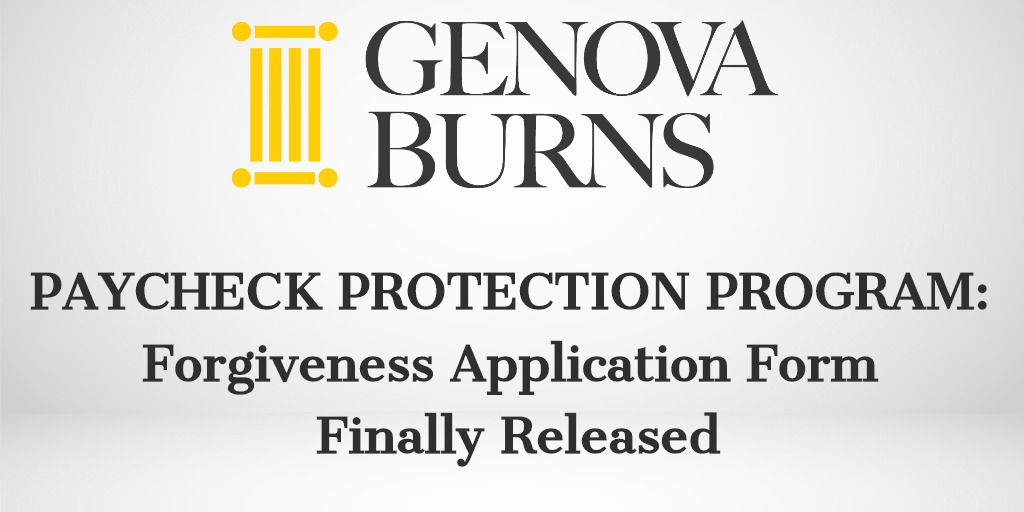Paycheck Protection Program Forgiveness Application Form Finally Released!
May 17, 2020 | By: Keith A. Krauss, Esq.
The Treasury Department and the U.S. Small Business Administration (SBA) have released the Paycheck Protection Program Loan Forgiveness Application, which sheds further light into how borrowers may seek, and obtain, forgiveness of their Paycheck Protection Program loans. In addition to worksheets that calculate eligible forgiveness amounts, the loan application and its accompanying instructions clarify a few prior unknowns (mysteries):
- Average Full-Time Equivalent Employees: Average full-time equivalent employees are based on a 40-hour workweek. The instructions direct employers to enter the average number of hours paid per week for each employee, divide by 40, and round to the nearest tenth. The maximum for each employee will be capped at 1.0. The instructions also offer a simplified method that assigns a full-time equivalent number (FTE) of 1.0 for employees who work 40 hours or more per week and 0.5 for employees who work fewer hours, at the borrower’s/employer’s option. Note this is important for purposes of computing any reductions to the loan forgiveness amount based on headcount. Borrowers/employers should be consistent in computing its full-time equivalent numbers for each measured period.
- Excused Reductions in Workforce: The instructions also clarify additional circumstances where workforce reductions will not reduce borrower’s/employer’s loan forgiveness. Previously, the Treasury Department and the SBA, in the Program’s Frequently Asked Questions (Question #40), have stated that borrowers/employers who had laid off employees (between February 15, 2020 and April 26, 2020) and offered to rehire the same employee, but whose employees reject such offer of re-employment, will not be penalized, and their forgiveness amount will not be subject to reduction therefor, for such reason as long as the business/employer had made a good faith, written offer of rehire, and the employee’s rejection of such offer is documented by the employer/borrower. In addition, in these instructions, the Treasury Department and SBA make clear that borrowers/employers will not be penalized (i.e. their forgiveness amount will not be reduced) due to (i) termination of an employee for cause, (ii) voluntary resignation by employee, or (ii) a reduction of hours at the voluntary request by an employee.
- Eligible Forgiveness Costs must be Incurred and Paid during Covered Period: For purposes of determining payroll costs eligible for forgiveness, the instructions offer the following guidance:
- Incurred payroll costs: Payroll costs are incurred on the day that the employee’s pay is earned.
- Paid payroll costs: Payroll costs are paid on the day that paychecks are distributed or when the borrower/employer initiates an ACH credit transaction.
Payroll costs for which forgiveness is sought must be paid during the 8-week forgiveness period, except that payroll costs incurred but not paid during the borrower’s/employer’s last pay period of the 8-week forgiveness period (or alternate covered period*) are eligible for forgiveness if paid on or before the next regular payroll date.
*The instructions permit borrowers/employers to elect an alternate payroll covered period, which allows borrowers/employers to begin the eight week pay period on the date that begins on the first day of their first pay period following the disbursement date of the Paycheck Protection Program loan, for administrative convenience. Note this only applies for payroll costs, not rent, utilities, and interest on mortgage obligations.
Eligible nonpayroll costs must be paid during the 8-week forgiveness period or incurred during the 8-week forgiveness period and paid on or before the next regular billing date, even if the billing date is after the 8-week forgiveness period. Please be reminded that eligible nonpayroll costs, i.e. qualifying rent, mortgage interest and utilities, may not exceed 25% of the forgiveness amount (or the PPP loan amount).
Please click here for the complete application.
For additional help and guidance, please contact firm Counsel Keith A. Krauss, Esq. at kkrauss@genovaburns.com or Associate Young-Ji Park, Esq. at ypark@genovaburns.com or 973.533.0777.
Tags: Genova Burns LLC • Keith A. Krauss • Young-Ji Park • COVID-19 • PPP • Paycheck Protection Program • SBA


